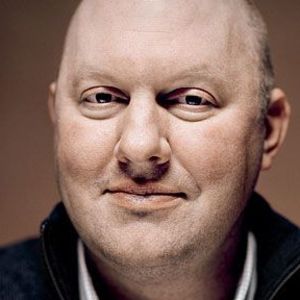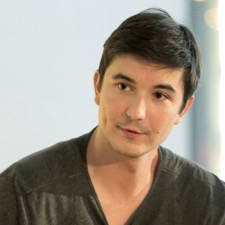Want to know what books Albert Wenger recommends on their reading list? We've researched interviews, social media posts, podcasts, and articles to build a comprehensive list of Albert Wenger's favorite book recommendations of all time.
1

Major New York Times bestseller
Winner of the National Academy of Sciences Best Book Award in 2012
Selected by the New York Times Book Review as one of the best books of 2011
A Globe and Mail Best Books of the Year 2011 Title
One of The Economist's 2011 Books of the Year
One of The Wall Street Journal's Best Nonfiction Books of the Year 2011
2013 Presidential Medal of Freedom Recipient
In the international bestseller, Thinking, Fast and Slow, Daniel Kahneman, the renowned psychologist and winner of the Nobel... more Major New York Times bestseller
Winner of the National Academy of Sciences Best Book Award in 2012
Selected by the New York Times Book Review as one of the best books of 2011
A Globe and Mail Best Books of the Year 2011 Title
One of The Economist's 2011 Books of the Year
One of The Wall Street Journal's Best Nonfiction Books of the Year 2011
2013 Presidential Medal of Freedom Recipient
In the international bestseller, Thinking, Fast and Slow, Daniel Kahneman, the renowned psychologist and winner of the Nobel Prize in Economics, takes us on a groundbreaking tour of the mind and explains the two systems that drive the way we think. System 1 is fast, intuitive, and emotional; System 2 is slower, more deliberative, and more logical. The impact of overconfidence on corporate strategies, the difficulties of predicting what will make us happy in the future, the profound effect of cognitive biases on everything from playing the stock market to planning our next vacation—each of these can be understood only by knowing how the two systems shape our judgments and decisions.
Engaging the reader in a lively conversation about how we think, Kahneman reveals where we can and cannot trust our intuitions and how we can tap into the benefits of slow thinking. He offers practical and enlightening insights into how choices are made in both our business and our personal lives—and how we can use different techniques to guard against the mental glitches that often get us into trouble. Winner of the National Academy of Sciences Best Book Award and the Los Angeles Times Book Prize and selected by The New York Times Book Review as one of the ten best books of 2011, Thinking, Fast and Slow is destined to be a classic. less 
Barack ObamaA few months ago, Mr. Obama read “Thinking, Fast and Slow,” by Daniel Kahneman, about how people make decisions — quick, instinctive thinking versus slower, contemplative deliberation. For Mr. Obama, a deliberator in an instinctive business, this may be as instructive as any political science text. (Source)

Marc AndreessenCaptivating dive into human decision making, marred by inclusion of several/many? psychology studies that fail to replicate. Will stand as a cautionary tale? (Source)
2

In this must-read book for anyone striving to succeed, pioneering psychologist Angela Duckworth shows parents, educators, students, and business people both seasoned and new that the secret to outstanding achievement is not talent but a focused persistence called grit.
Why do some people succeed and others fail? Sharing new insights from her landmark research on grit, Angela Duckworth explains why talent is hardly a guarantor of success. Rather, other factors can be even more crucial such as identifying our passions and following through on our commitments.
Drawing on... more In this must-read book for anyone striving to succeed, pioneering psychologist Angela Duckworth shows parents, educators, students, and business people both seasoned and new that the secret to outstanding achievement is not talent but a focused persistence called grit.
Why do some people succeed and others fail? Sharing new insights from her landmark research on grit, Angela Duckworth explains why talent is hardly a guarantor of success. Rather, other factors can be even more crucial such as identifying our passions and following through on our commitments.
Drawing on her own powerful story as the daughter of a scientist who frequently bemoaned her lack of smarts, Duckworth describes her winding path through teaching, business consulting, and neuroscience, which led to the hypothesis that what really drives success is not genius, but a special blend of passion and long-term perseverance. As a professor at the University of Pennsylvania, Duckworth created her own character lab and set out to test her theory.
Here, she takes readers into the field to visit teachers working in some of the toughest schools, cadets struggling through their first days at West Point, and young finalists in the National Spelling Bee. She also mines fascinating insights from history and shows what can be gleaned from modern experiments in peak performance. Finally, she shares what she's learned from interviewing dozens of high achievers; from JP Morgan CEO Jamie Dimon to the cartoon editor of The New Yorker to Seattle Seahawks Coach Pete Carroll.
Winningly personal, insightful, and even life-changing, Grit is a book about what goes through your head when you fall down, and how that not talent or luck makes all the difference. less 
Sujan PatelPut aside your insecurities over any lack of talent and ability you might feel, and pick up Angela Duckworth's book Grit. Instead of focusing on the idea that there’s a big secret behind outstanding achievement, Duckworth touts the importance of blending passion and relentless persistence, otherwise known as grit. Duckworth herself is the daughter of scientists who frequently told her she lacked... (Source)

Stephen LewWhen asked what books he would recommend to youngsters interested in his professional path, Stephen mentioned Grit. (Source)

Bogdan LucaciuGrit: The Power of Passion and Perseverance - it was frustrating to read: “Where was this book 20 years ago!?” (Source)
3
The Beginning of Infinity: Explanations That Transform the World more The Beginning of Infinity: Explanations That Transform the World less 
Mark ZuckerbergReading has given me more perspective on a number of topics — from science to religion, from poverty to prosperity, from health to energy to social justice, from political philosophy to foreign policy, and from history to futuristic fiction.
This challenge has been intellectually fulfilling, and I come away with a greater sense of hope and optimism that our society can make greater progress in... (Source)

Chris AndersonA remarkable argument for the power of knowledge—as not just a human capability but as a force that shapes the universe. (Source)

Chris AndersonA remarkable argument for the power of knowledge—as not just a human capability but as a force that shapes the universe. (Source)
4

From the bestselling author of The Black Swan and one of the foremost philosophers of our time, Nassim Nicholas Taleb, a book on how some systems actually benefit from disorder.
In The Black Swan Taleb outlined a problem; in Antifragile he offers a definitive solution: how to gain from disorder and chaos while being protected from fragilities and adverse events. For what he calls the "antifragile" is one step beyond robust, as it benefits from adversity, uncertainty and stressors, just as human bones get stronger when subjected to stress and tension.
Taleb stands... more From the bestselling author of The Black Swan and one of the foremost philosophers of our time, Nassim Nicholas Taleb, a book on how some systems actually benefit from disorder.
In The Black Swan Taleb outlined a problem; in Antifragile he offers a definitive solution: how to gain from disorder and chaos while being protected from fragilities and adverse events. For what he calls the "antifragile" is one step beyond robust, as it benefits from adversity, uncertainty and stressors, just as human bones get stronger when subjected to stress and tension.
Taleb stands uncertainty on its head, making it desirable, and proposing that things be built in an antifragile manner. Extremely ambitious and multidisciplinary, Antifragile provides a blueprint for how to behave-and thrive-in a world we don't understand and which is too uncertain for us to even try to understand. He who is not antifragile will perish. Why is the city state better than the nation state, why is debt bad for you, and why is almost everything modern bound to fail? The book covers innovation, health, biology, medicine, life decisions, politics, foreign policy, urban planning, war, personal finance, and economic systems. Throughout, the voice and recipes of the ancient wisdom from Phoenician, Roman, Greek, and Medieval sources are heard loud and clear. less 
Marvin Liaoeval(ez_write_tag([[250,250],'theceolibrary_com-leader-2','ezslot_7',164,'0','1']));
My list would be (besides the ones I mentioned in answer to the previous question) both business & Fiction/Sci-Fi and ones I personally found helpful to myself. The business books explain just exactly how business, work & investing are in reality & how to think properly & differentiate yourself. On... (Source)

James AltucherYou ask about success. To be successful you have to avoid being “fragile” – the idea that if something hurts you, you let collapse completely. You also have to avoid simply being resilient. Bouncing back is not enough. Antifragile is when something tries to hurt you and you come back stronger. That is real life business. That is real life success. Nassim focuses on the economy. But when I read... (Source)

Vlad TenevThe general concept is applicable to many fields beyond biology, for instance finance, economics and monetary policy. (Source)
5

It’s a tremendous privilege to raise children, though for a quite different reason than most of us who are parents imagine.
While we think it’s our responsibility to mold and shape our children’s future, the essential premise of Dr. Shefali Tsabary’s A Call to Conscious Parenting is that our children are born to us to create deep internal transformation within us.
Our children have the power to unleash our egoic behavior unlike anyone else, triggering all of our emotional reactivity. As, through our intimate relationship with them, we are exposed to our... more It’s a tremendous privilege to raise children, though for a quite different reason than most of us who are parents imagine.
While we think it’s our responsibility to mold and shape our children’s future, the essential premise of Dr. Shefali Tsabary’s A Call to Conscious Parenting is that our children are born to us to create deep internal transformation within us.
Our children have the power to unleash our egoic behavior unlike anyone else, triggering all of our emotional reactivity. As, through our intimate relationship with them, we are exposed to our immaturity, they become our most accurate mirror of our own lack of emotional development. In other words, by inviting us to confront who we are in our relationship with them, our children raise us to be the parents they long for us to become.
Despite our best intentions to raise our children well, in our unconsciousness we pass on emotional legacies to our children that have deep and lasting repercussions. Bequeathing to them our unresolved needs, unmet expectations, and frustrated dreams, we shackle them in unconscious patterns that shut them down to their own unique being.
To do justice to parenthood, a parent needs to become conscious. Only to the degree we are willing to transform our own emotional present do we succeed in positively influencing our children’s future.
Dr. Tsabary asks us to set aside traditional parenting strategies that major in controlling our children and instead find true kinship with their spirits by tuning into who each child is in its own unique essence. Surrendering to the oneness of the parent-child relationship in this way lifts parenting out of the physical and into the realm of the sacred.
Peppered with practical, hands-on examples from Dr. Tsabary’s real-life experiences with the countless families she has helped journey consciously together, A Call to Conscious Parenting is a manual for giving our children the opportunity to shine and dazzle with their natural state of being. less 6

Why do companies so often fail to give customers what they want? "Customers Included" provides a roadmap for any executive or entrepreneur who wants to create better products and services. Using real-world case studies—from Apple, Google, Netflix, and Walmart to an African hand pump, a New York City park, and the B-17 bomber—the book clearly explains why including the customer is an essential ingredient of success for any team, company, or organization. Mark Hurst, a pioneer in the field of customer experience, provides practical tips for a strategic, customer-inclusive approach that... more Why do companies so often fail to give customers what they want? "Customers Included" provides a roadmap for any executive or entrepreneur who wants to create better products and services. Using real-world case studies—from Apple, Google, Netflix, and Walmart to an African hand pump, a New York City park, and the B-17 bomber—the book clearly explains why including the customer is an essential ingredient of success for any team, company, or organization. Mark Hurst, a pioneer in the field of customer experience, provides practical tips for a strategic, customer-inclusive approach that generates results. less Don't have time to read Albert Wenger's favorite books? Read Shortform summaries.
Shortform summaries help you learn 10x faster by:
- Being comprehensive: you learn the most important points in the book
- Cutting out the fluff: you focus your time on what's important to know
- Interactive exercises: apply the book's ideas to your own life with our educators' guidance.





